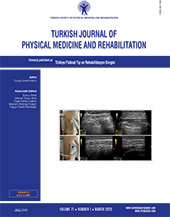Evaluation of fear of falling, balance, and kinesiophobia in earthquake survivors: A comparative study between older and young adults
Patients and methods: In this single-center, cross-sectional study, a total of 260 Kahramanmaraş earthquake survivors (105 males, 155 females; median age: 44.0 years; range, 18 to 91 years) between May 08, 2024 and July 08, 2024 were included. The sociodemographic data including age, sex, body mass index (BMI), marital status (single, married, widow), education status (years), monthly income (TL), smoking status (never smoked, smoking before the earthquake or started smoking after the earthquake), alcohol intake (never, regular use of alcohol before the earthquake, or started alcohol consumption after the earthquake) of the participants were recorded. Comorbidities were evaluated using the modified Charlson Comorbidity Index (CCI), anxiety and depression using the Hospital Anxiety and Depression Scale (HADS), post-traumatic stress disorder using the National Stressful Events Survey for PTSD-Short Scale (NSESSS-PTSD), sleep disorders using the Jenkins Sleep Evaluation Scale (JSS), fear of falling using the Falls Efficacy Scale (FES), functional balance using the Berg Balance Scale (BBS), and kinesiophobia using the Tampa Scale for Kinesiophobia (TSK).
Results: Of the survivors (n=260), 4.6% and 33.8% experienced loss of first-degree relatives and house damage, respectively. The FES and TSK scores were higher, while the BBS score was lower in older adults (n=56) compared to younger counterparts (n=204) (p<0.001). Multivariate linear regression analysis revealed that increased age affected the BBS (β=–0.124; 95% CI: –0.263 to –0.185; p<0.001) and FES scores (β=0.404; 95% CI: 0.255 - 0.451; p<0.001). The PTSD-SS score had a significant effect on the FES score (β=0.915; 95% CI: 0.734 - 1.110; p<0.001).
Conclusion: The Kahramanmaraş earthquake caused detrimental effects. Older people were more affected in terms of balance, fear of falling, and kinesiophobia. Increased age and post-traumatic stress are significantly associated with fear of falling following the earthquake. As a potential risk factor for fear of falling, post-traumatic stress should be managed properly in survivors of such disasters, particularly in those at older age.
Keywords : Aged, aging, balance, earthquake, falls, kinesiophobia

















